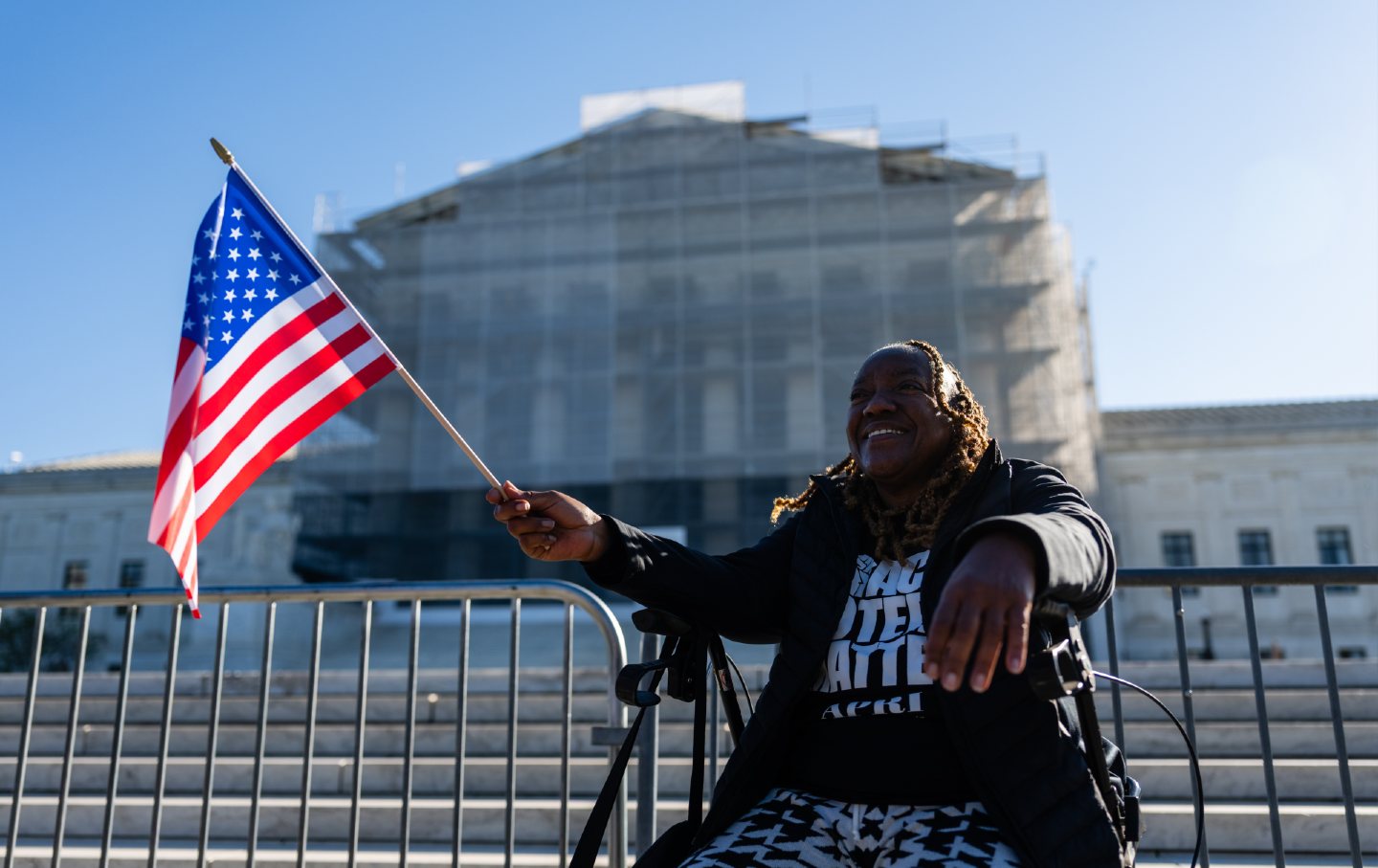Politics / October 16, 2025
The ruling, when it comes, will be disastrous for Black voters and for Democrats.

The Supreme Court heard oral arguments on Wednesday in Louisiana v. Callais, a case about whether Section 2 of the Voting Rights Act prevents white people from overrepresenting themselves in Congress. Oral arguments can sometimes sound like the justices are deliberating great and technical points of law, but the outcome in this case was decided long before the lawyers arrived at the courthouse. The six Republican justices are going to declare the Voting Rights Act inert and allow the dilution of Black voting rights through racist gerrymandering. Oral arguments were largely an exercise of the Republicans justifying their racist positions.
At issue were maps for congressional districts in Louisiana. The state has six congressional districts. After the 2020 Census, the state produced a map where five of those districts were majority white. But Louisiana is only 56 percent white, and 31 percent Black. Simple math should tell you that there should be at least two districts in Louisiana that are majority-minority.
That said, if math is not your thing (and it never is for Republicans when the math doesn’t result in their supremacy over others), then the Voting Rights Act and the 15th Amendment should be. Section 2 of the VRA allows the federal courts to intervene when a state discriminates against the voting rights of Black people. Louisiana was sued by the NAACP after the 2020 census, and a court ordered the state to redraw its maps, producing two majority-minority districts.
A group of white plaintiffs in Louisiana then countersued the state over its new, less racist maps, arguing (wait for it) that this application of the VRA violated their constitutional rights. The white litigants were arguing that their overrepresentation in Congress is permissible and that attempts to use the VRA to stop them is the real constitutional violation.
As I explained in my Supreme Court preview, the fact that the court agreed to hear this case at all is an indication of how the Republicans intend to rule. Louisiana v. Callais was first argued in the last term, but the justices could not reach a decision and scheduled a rare reargument for this term. The case is itself a carbon copy of a 2023 case, called Allen v. Milligan, in which the court ruled that Alabama could be forced to draw a second majority-minority district under the Voting Rights Act. The fact that the court was unwilling to apply its own precedent in Milligan to the case in Louisiana tells you that the court does not want to uphold the VRA.
Oral arguments on Wednesday functionally removed all doubt. Chief Justice John Roberts and alleged attempted rapist Brett Kavanaugh, the two justices who broke with their normal white supremacist positions and voted to uphold the VRA in Milligan, were both eager to treat the Louisiana case as a completely different thing. Roberts essentially argued that, in Milligan, the state all but conceded that it was in violation of the VRA, and asked the court to do away with it, while in Louisiana, the state argued that it would still be in compliance with the VRA even if it reduced minority representation to one majority-minority district—an argument that, if accepted, would render the VRA functionally meaningless. This is a common peg for Roberts to hang his hat on. As long as litigants aren’t coming to his court openly saying, “I want to do some racism,” Roberts loves to pretend that racism doesn’t exist.
Roberts’s moral obtuseness here isn’t just annoying (though it is that); it’s also a mischaracterization of the VRA. Section 2 of the Voting Rights Act does not require discriminatory intent in order to work. To win, plaintiffs literally do not have to prove that a state discriminated against Black people on purpose. Section 2 is concerned only with discriminatory outcomes. So if a state produces a map that discriminates against people trying to vote, that state is in violation of the VRA, even if the state “doesn’t have a racist bone in their body” or has “lots of Black friends” or whatever else it claims.
It’s a point that the liberal justices returned to again and again at oral arguments, which lasted over two and a half hours, but that Roberts seemed to ignore.
The lawyer representing the state of Louisiana—Louisiana Solicitor General J. Benjamin Aguiñaga—argued that Louisiana’s intent was not to discriminate on the basis of race but to discriminate on the basis of party. This argument is also Roberts’s fault. In 2019, in a case called Rucho v Common Cause, Roberts declared political gerrymandering “nonjusticiable,” which has turned out to mean that white state legislatures can discriminate against Black voting rights as much as they want as long as they claim to be discriminating against people who vote for Democrats. Section 2 of the Voting Rights Act was supposed to be the last line of defense against that kind of racism-by-another-name, because, again, the VRA is not concerned with intent, just outcomes. But Roberts and the other Republicans seemed poised to ignore that, and give Louisiana a license to discriminate.
Roberts flipping his position from Milligan to Louisiana would be enough to give the racists the win, but the second Republican in the Milligan majority, Kavanaugh, also appears set to abandon his position from just two years ago. Kavanaugh was fixated on what has come to be my least favorite white argument in any hearing about race: Surely racism has been solved by now. He wanted to know when we can declare that Louisiana and all other states have solved their racism problem sufficiently so that Section 2 of the Voting Rights Act is no longer necessary, and he was disappointed when Janai Nelson, the head of the NAACP Legal Defense Fund, couldn’t give him a hard-and-fast date for when racism will be solved.
Again, I hate this argument. White people enact racist policies, we make laws to try to stop them from enacting racist policies, those laws kinda, more or less, work sometimes, and then white people say, “See, we’ve solved it. We don’t need the law anymore.” As Ruth Bader Ginsburg once said, the Republican argument amounts to throwing away your umbrella in a thunderstorm because you’re not wet yet. Racism will be over when white folks stop doing it. And you’ll know they’ve stopped doing it when we no longer have white lawsuits aimed at overturning the laws meant to stop white folks from being racist!
In any event, while Roberts and Kavanaugh twisted themselves into pretzels to go back on their previous rulings, the other conservatives, who were all in the dissent in Milligan, reprised their feigned abhorrence at considering race to counteract racism. The best way I can describe the arguments from Justices Thomas, Alito, Gorsuch, and Barrett is to say that they think it is OK for white folks in Louisiana to use race to draw discriminatory maps, but it’s not OK for Black folks to use race to draw inclusionary maps. As always with these people: White makes right.
If you’re looking for a silver lining, I can at least report that the white-people argument the plaintiffs were trying to make—“inclusive maps violate our equal protection rights”—got absolutely no play from the Supreme Court. The Republicans are going to allow Louisiana to discriminate, but they’re not going to say discrimination is required by the 14th Amendment in order to make white folks feel “more equal” than everybody else (at least, they’re not going to say that in this case). The lawyer representing the white plaintiffs, Eddie Greim, was… I believe the scientific term is “dog-walked” by the Democratic justices. Usually, when one of their boys is getting humiliated by the liberal women, one of the white guys on the court pipes up to throw their brother a lifeline. But not this time. The Republicans remained silent as Mr. Greim got all that was coming to him. He was only at the podium for 15 minutes, but 15 minutes is a long time when you are getting repeatedly run over by a bus.
Unfortunately, the fact that the white plaintiffs who brought the case got stomped by the liberals will not matter one whit when it comes to decision time. I believe Kavanaugh articulated what will be the court’s eventual 6–3 holding. He essentially said that Section 2 of the Voting Rights Act is constitutional, but the application of Section 2 to a map where the intent to discriminate cannot be shown is unconstitutional. They’ll avoid the headline “Supreme Court overturns the Voting Rights Act,” but they will neuter the VRA to the point that it’s no longer allowed to function.
If that is indeed the decision that comes down from the Supreme Court in June 2026, I’m sure Louisiana will try to redraw its congressional maps to go back to only one majority-minority district ahead of the 2026 midterms, netting Republicans an additional seat in Congress. Some analysts believe that this Supreme Court ruling could result in as many as 19 congressional seats being shifted to the Republicans by means of racially gerrymandering away Black voting power.
The question I’m always asked in these situations is, “OK so what can the Democrats do about this horrible Supreme Court ruling?” At this point, my answer is basically, “I dunno, go back to 2021 and expand the court when you had the chance, like I told you to do.” Leaving Republicans in charge of the court is and always has been an existential threat to the Democratic Party, and cases like Louisiana v. Callais are the reason why. The Democratic Party cannot survive the loss of Black voting rights, and so when the party refuses to protect those voting rights when it can, the party is ensuring its future defeat. We are now suffering the consequences of the Democrats’ past inaction.
Popular
“swipe left below to view more authors”Swipe →
Given what has come to pass, the only real option for the Democrats is to gerrymander the states they control to the absolute maximum, hope that the Republicans in their hubris allow there to be an election in 2028, hope that Republicans lose that election, hope that Republicans don’t use the military to steal an election they lost, and then use tiny Democratic majorities to completely remake the electoral system and the Supreme Court. There’s nothing I know about establishment Democrats that tells me they have the will to do that, even if they are allowed to take power again, but that’s the play.
The solution, if there is one, is political, not legal. “The law” is of no more use here. The Republican Supreme Court is about to overturn a Republican ruling the Republicans made only two years ago. That alone should tell you that the law, as it is practiced by the Supreme Court, is utterly useless. The Republican justices have the power to do whatever they want. And what they want, today, is to flip Congress in favor of Republicans.
I continue to live in fear of what they’ll want tomorrow.
Elie Mystal
Elie Mystal is The Nation’s justice correspondent and a columnist. He is also an Alfred Knobler Fellow at the Type Media Center. He is the author of two books: the New York Times bestseller Allow Me to Retort: A Black Guy’s Guide to the Constitution and Bad Law: Ten Popular Laws That Are Ruining America, both published by The New Press. You can subscribe to his Nation newsletter “Elie v. U.S.” here.






